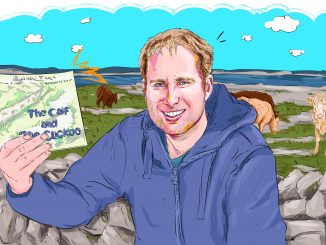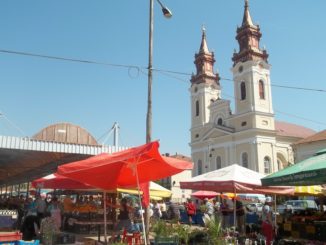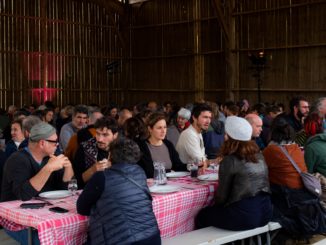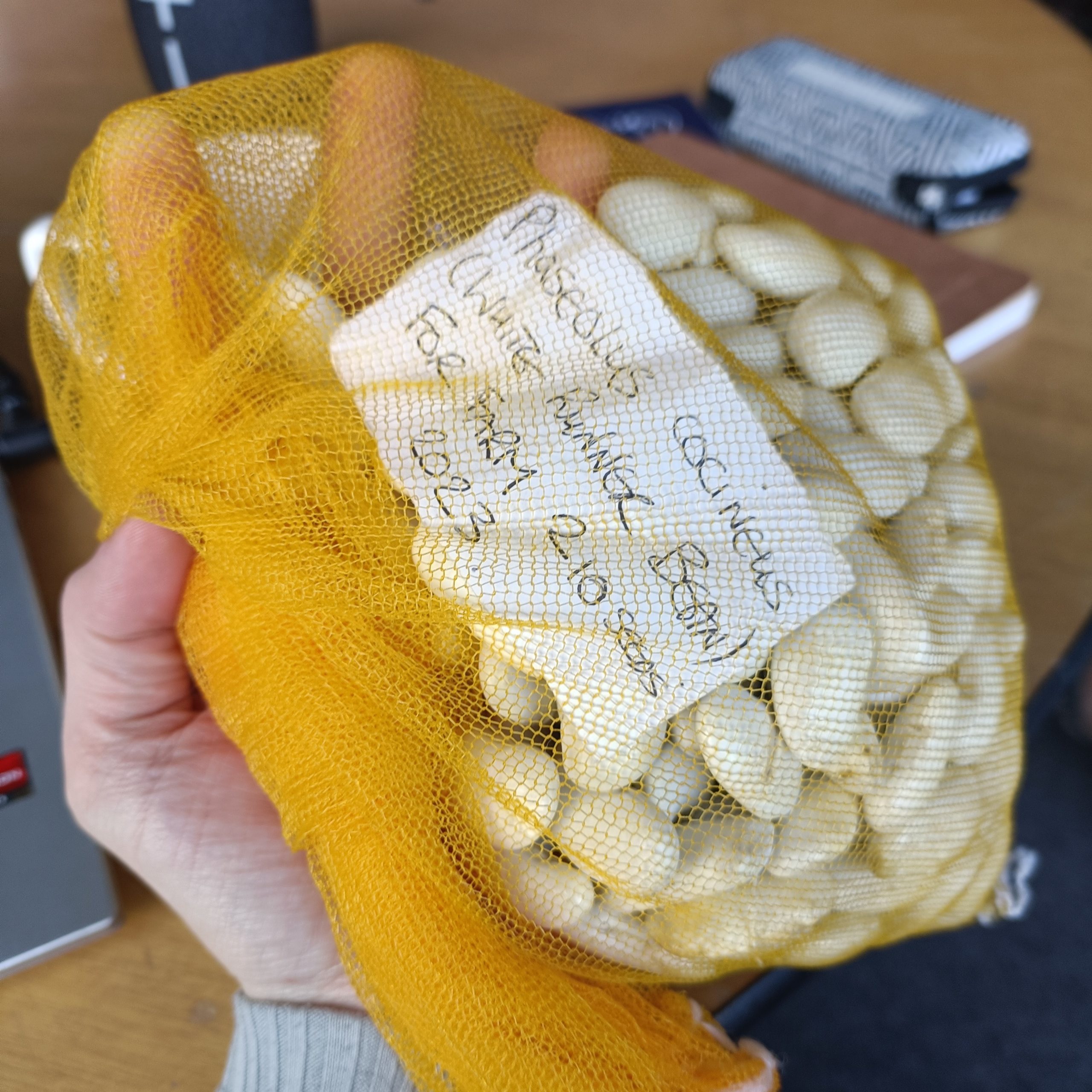
Our Seeds4All project was back in Ireland in March to be part of Feeding Ourselves 2024. We are inheritors of a genetic commons that we have to protect. While working on the ground we need to be vigilant about what is happening at legal level – and work together. In partnership with the Irish Seed Savers Association, Seeds4All brought a European perspective to Cloughjordan, Co. Tipperary, co-hosting a first workshop on seed policy, and a second more hands-on workshop that looked at how to adapt and save seeds for the future. Adèle Pautrat from Seeds4All reports.
Seed cannot be considered as a simple agricultural input. It is the very basis of our food and farming sovereignty. It carries in itself an energy of life, cooperation and continuous adaptation that commands inspiration. Defending the right to seed autonomy and diversity is a key driver in restoring meaning to our eating habits and that is the narrative we’re committed to nurturing.
Returning to Ireland to take part in the Feeding Ourselves event was a great opportunity for the Seeds4All project to share that vision and to discuss what we observe and learn while travelling across Europe to meet seed enthusiasts. The level of knowledge, creativity and engagement we observed during the three days of talks and workshops gave us great incentives for future activities – convincing us even further of the importance of elevating hands-on experiences, caring for positive stories and defending the commons.
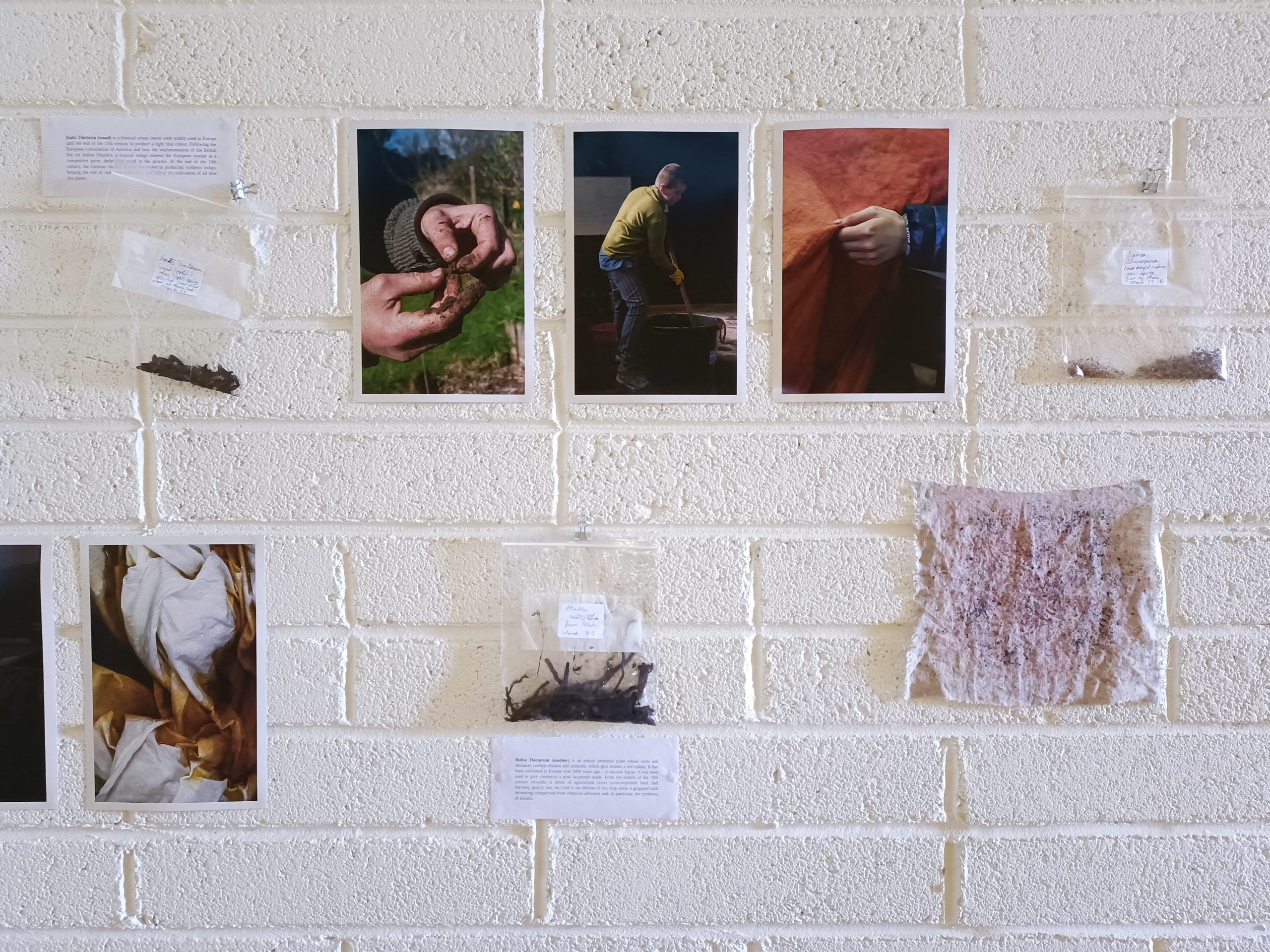
From seed to fibre
Seeds4All took the opportunity of Feeding Ourselves 2024 to present an exhibition of photos and seeds introducing the results of a series of visits and activities carried out in Ireland in 2023.
Addressing the issues of reintroducing locally-adapted plants to support textile production initiatives valuing their local roots, this first Irish tour had led to the facilitation of a breakout session and a natural-dyeing workshop at Feeding Ourselves 2023.
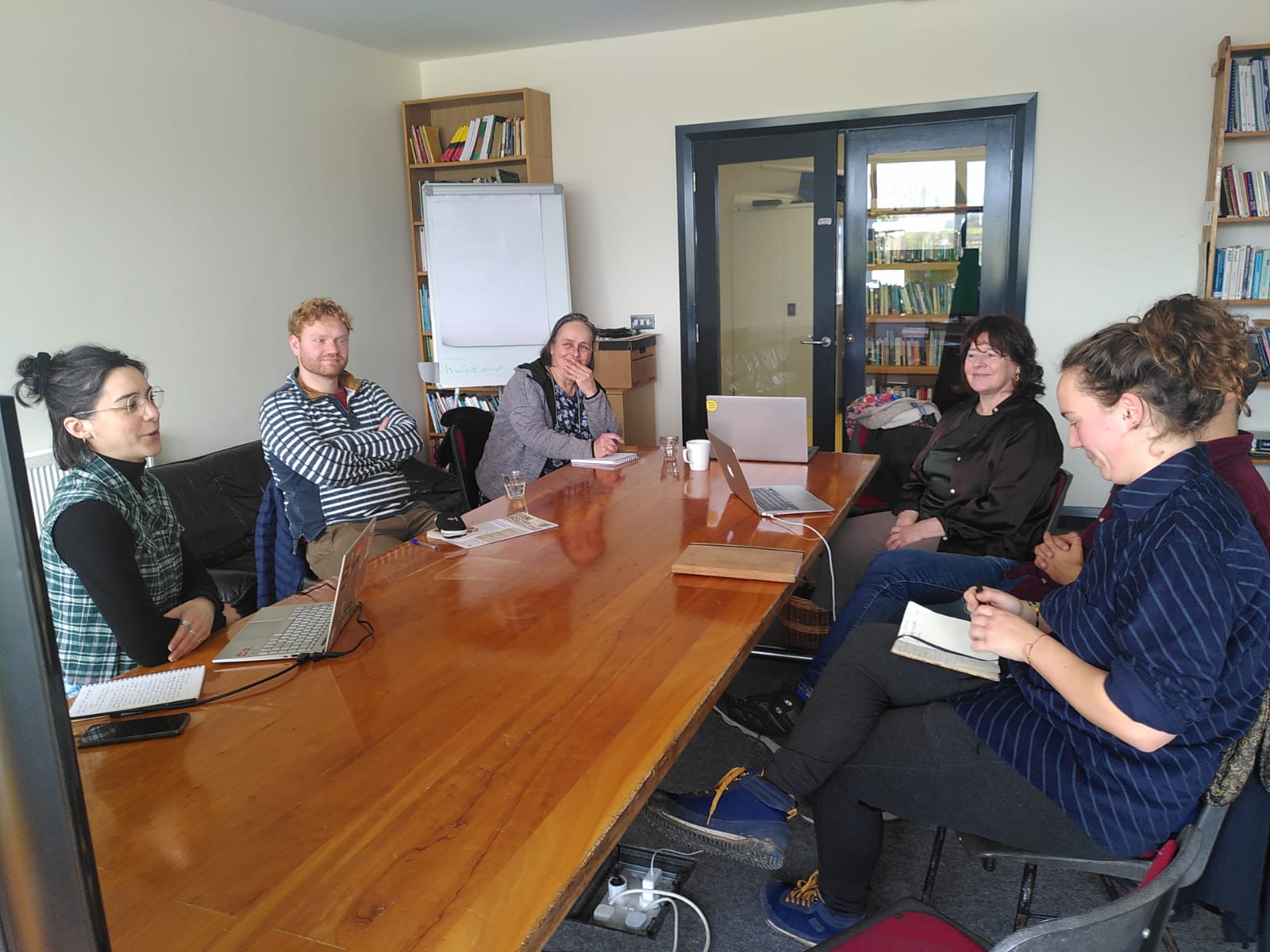
Seed policy workshop
Last year’s Irish tour, including a visit to the garden of the Irish Seed Savers Association, helped set the context for a Seed Policy workshop with ISSA on Thursday 21 March 2024.
As an introduction to the issues related to access, use and reproduction of seeds in Europe, Seeds4All shared some insights into the ongoing reform of the EU seed marketing legislation tabled in July 2023 by the European Commission (see box for more detail).
Reform of the EU seed marketing legislation
This legislative initiative comes around 10 years after a first and only attempt rejected by the European Parliament. The current legal framework for the production and circulation of seeds in Europe is the same since its introduction in the 1960s, and it has largely contributed to limiting the sale and exchange of reproducible and diversified seeds – in particular by increasing the dependence of farmers on industrial seeds, and by requiring the registration of varieties in official catalogues according to criteria of homogeneity and stability to which population varieties cannot meet.
The Parliament’s work on amending the Commission’s proposed reform of the EU seed marketing legislation has been carried out since last summer by the AGRI Committee. Herbert Dorffmann (EPP) has been appointed Rapporteur on the text by the EPP. Other political groups within the Committee appointed shadow rapporteurs to coordinate their positions on the issue: Isabel Carvalhais (S&D), Martin Hausling (Greens/EFA), Luke Flanagan (The Left), Irene Tolleret (Renew) and Bert Ruissen (ECR). The ENVI Committee (Rapporteur: Christophe Clergeau, S&D), has been sharing responsibility on certain aspects of the text; in particular on the definition and control of the “value of sustainable cultivation and use” (VSCU – another criterion to be met to register and market a variety) and on the very controversial issue of the patenting of seeds.
After tabling more than 800 amendments to the Commission’s proposal, Committees voted on their respective positions in March. In short: real improvements have been made to the initial proposal and compared to the current seed regulatory framework, as concerning the rights for farmers to exchange seeds and to access the varieties provided by conservation networks – albeit with some restrictions.
This demonstrates political awareness of the need to recognise the role of agrobiodiversity in agricultural resilience, which however needs to be qualified. As a matter of fact, the place given to so-called “amateur” varieties and to practices of conservation and regeneration of cultivated biodiversity remains largely secondary, benefiting from exceptions and derogations within a legislation primarily intended to meet the needs of the industrial model. As an illustration: MEPs failed to relieve artisan seed producers of unreasonable bureaucratic demands unsuitable for the reality of their activity.
The next key stage of this reform will be the plenary vote by the European Parliament on April 24. Inter-institutional negotiations will then begin, during which the Parliament and the Council will have to find an agreement on the text, under the supervision of the Commission.
Remember that as farmers, gardeners, food producers, activists, citizens: you definitely have your say! MEPs work for us, their first commitment is to listen to voters – and especially in the current pre-electoral context, rest assured that they are keen to show they’re listening!
There are associations involved in advocacy work at the European level that facilitate your ability to act: writing recommendations and email templates, sending contact information, creating open source materials for you to use – all they need is for their campaigns to be supported by as many people as possible. And it works: many of the progressive amendments passed to date have been introduced thanks to the tireless work of seed-saving organisations, supported by civil society.
To access further information, we invite you to subscribe to the Seeds4All newsletter and to support the work of our campaigning partner Arche Noah. You can start engaging now by signing the “Raise our forks!” petition, supported by dozens of organisations and now signed by over 100,000 people across Europe!
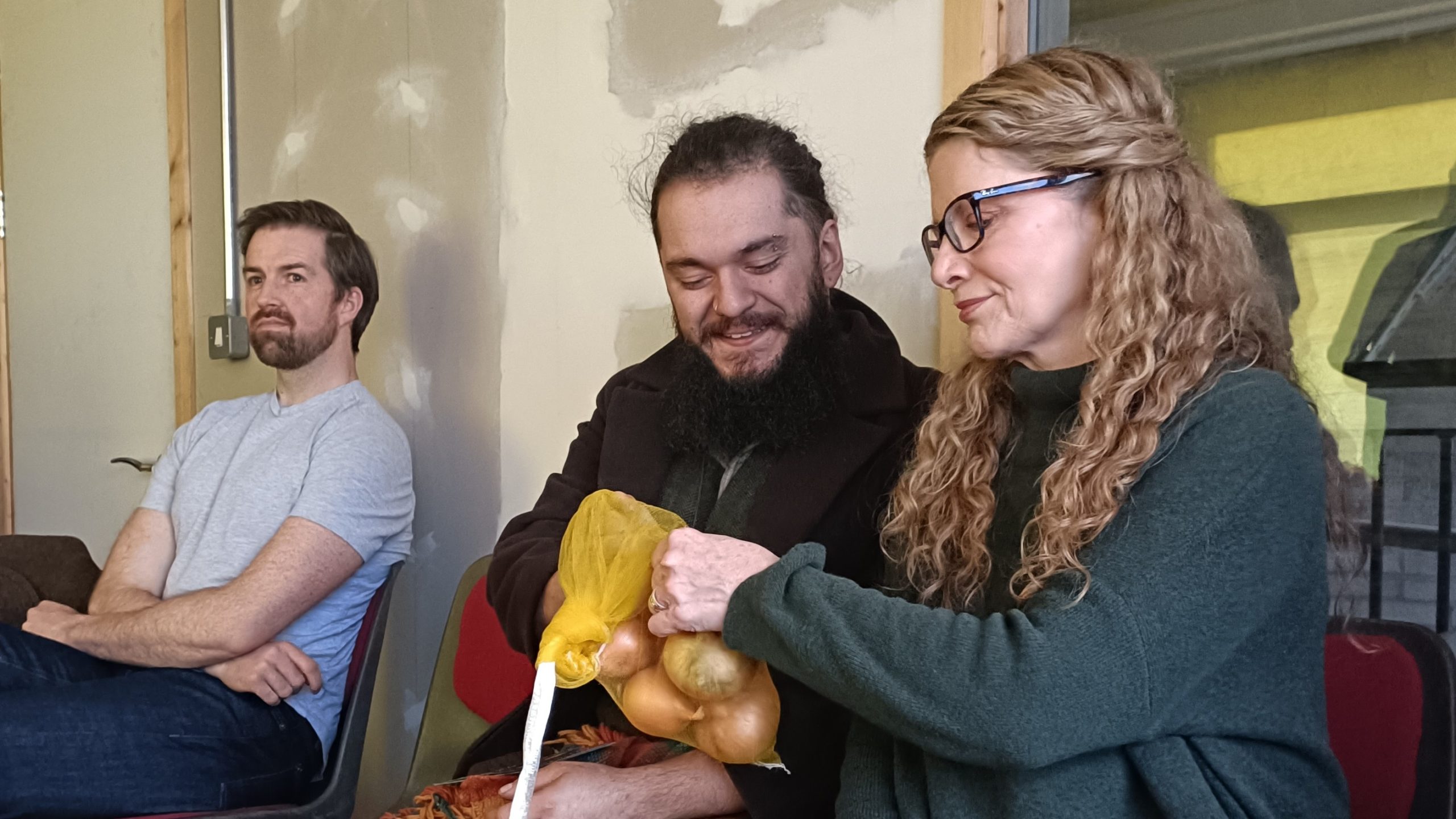
Reversing the loss of agrobiodiversity – the Irish context
Another organisation particularly involved in defending the right to seed autonomy and diversity is the Irish Seed Savers Association.
Elaine Bradley, ISSA’s General manager and Sorcha Sheehy Williams, member of the Garden team, introduced the challenges and successes of their work, as Ireland’s leading organisation for the preservation of national genetic resources.
The Irish Seed Savers work according to the “conservation through use” methodology, which means that seed varieties are not only preserved but they are used and reproduced “on site” – unlike certain seed banks managing reproduction and storage in laboratories and refrigerators. Conservation through use is needed to guarantee 1/ the seed germination rate and sustainability, and 2/ their constant adaptation to changing soils, climate, pests, etc.
It is also a practice that demonstrates the association’s commitment to the objective of making agrobiodiversity accessible to people. And as such, it must face the limitations imposed by European legislation. Like the time when local farmer Maurice Deasy was looking for pea seeds to trial intercropping. Prohibited from selling seeds to a professional operator, the association had to set up a system of exchanging material for reproduction purposes: officially, it entrusted the farmer with a batch of seeds to test in his field. Once done, Deasy had to return the batch of seeds to ISSA – keeping only the surplus for himself.
It is to fight against these absurd and counterproductive situations that ISSA is involved in advocacy efforts at European scale. In connection with the current seed legislation reform, they worked closely with MEP Luke Flanagan, shadow rapporteur of the Left group, who undertook to table a significant number of amendments to the text on their advice.
Irish Seed Savers’ commitment to developing national genetic resources
The Irish Seed Savers Association was born 32 years ago. It owns 22 hectares of land in Co. Clare, using only two for organic seed production, while devoting the rest to implementing an agroecological approach (respecting ecosystems, planting trees, protecting wild and animal species, taking care of the soil, maintaining fallow lands, etc.).
ISSA’s gardeners take care of a collection of 600 reproducible varieties including landraces as well as crop varieties collected from all over the world and adapted to Ireland’s growing conditions. But the most impressive work accomplished by the association over the last thirty years has been the creation of the national collection of Irish heritage apple trees, now made up of more than 180 varieties. For more information on the Irish Seed Savers association work, you can consult their website and read the Seeds4All report of March 2023.
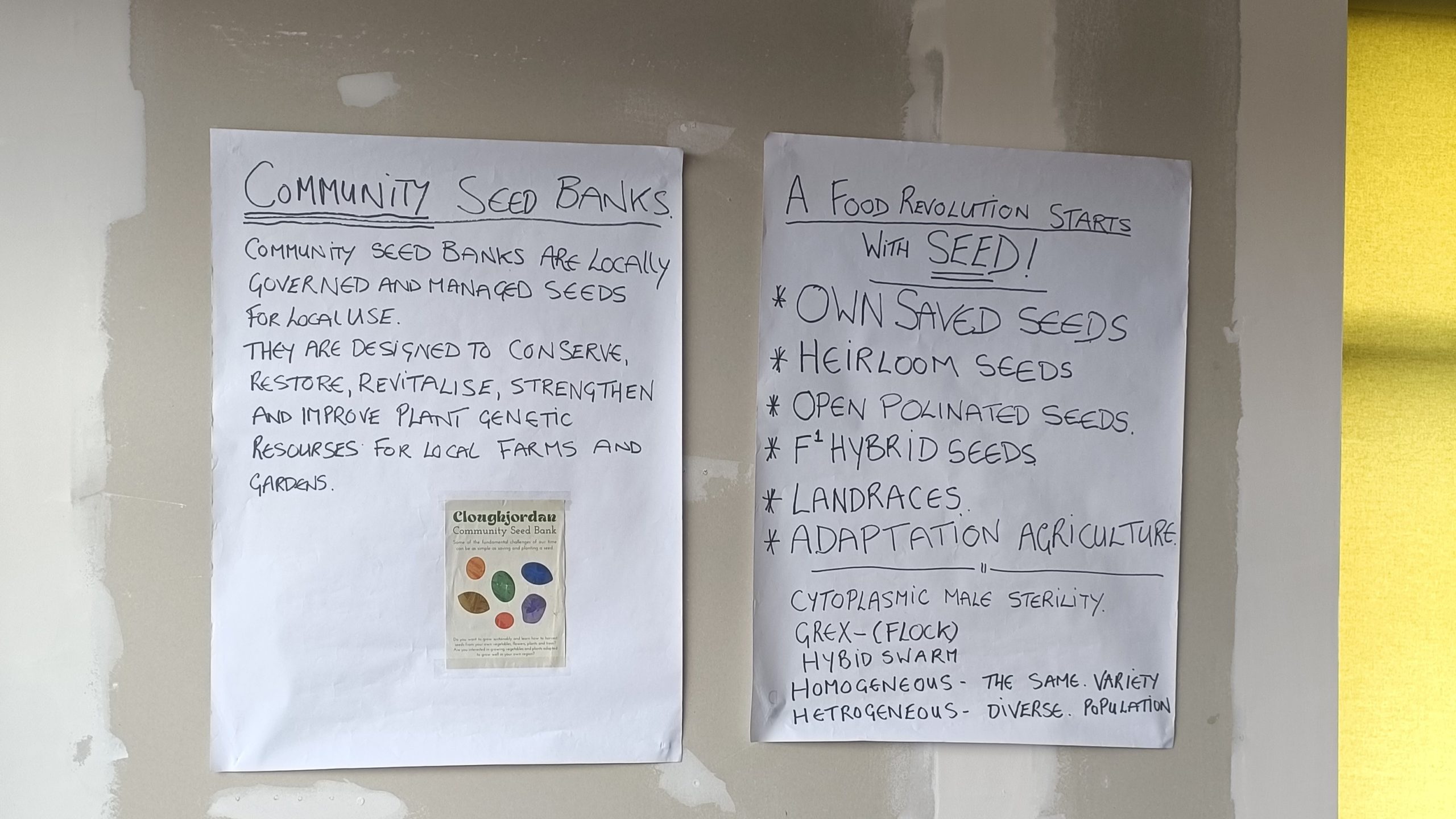
Adapting and saving seeds for the future
The Saturday seed session was devoted to building capacity and movements.
We had planned the screening of a brand new film available online: the short documentary Seeds of Europe, directed by Lotta Schwenkert and Lennart Kleinschmidt. These two directors travelled across Europe, from Ireland to the Czech Republic, to document the work and collect the stories of artisan seed producers, organic farmers and conservation networks. The result of their investigation provides a good overview of the struggles to develop and access ecological seeds of population varieties, in a context marked by years of criminalisation of the right to seed autonomy.
While watching the film, I found it particularly captivating to embark on a journey through a multitude of agricultural and rural landscapes, bringing me face to face with the meaning and beauty of diversity. The people interviewed also embody this idea very well, evolving in different cultural, professional and economic contexts. And yet, we are struck by the uniformity of their testimonies. By the fact that they’re all encountering the same difficulties, the same obstacles to the development of their activities. And with good reason: these obstacles are primarily not natural and climatic, as it used to be the case for people growing food. They are regulatory.
This particularly highlights the legislative and therefore political responsibility for the massive erosion of cultivated biodiversity we’re facing. Since the end of World War 2, the legislator has taken one side, that of the industrialisation of agriculture, and it has become an accomplice to the global steamroller homogenising our food, our farming and our cultures. In fact, one of the most important messages to convey when it comes to raising awareness about seed diversity, is that we’re primarily opposing this ambition of gaining control over seeds, plants and the living world in general.
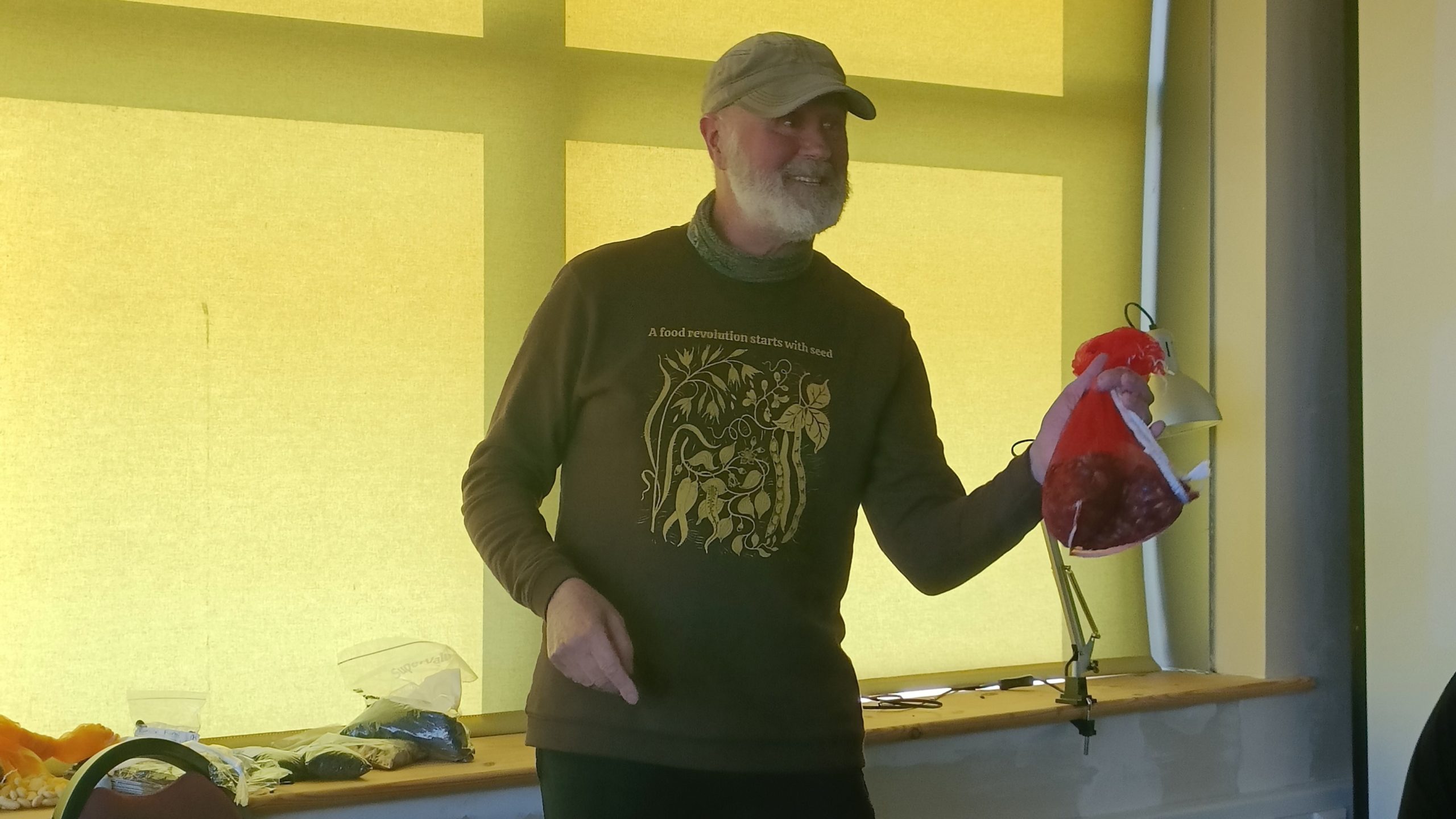
Fortunately, many models challenge this perspective, defending instead the idea of seeds as commons, like the international movement of Community Seed Banks. Kevin Dudley is responsible for the CSB at Cloughjordan Community Farm. His primary ambition when he got involved in this project was precisely to enable the management of local genetic resources for local use, making sure to improve the production capacities of local farms and gardens and the quality of food for local people. Something that must be carried like an activist standard today when it was considered completely common, and let’s say it: coherent, only sixty years ago.
As Kevin demonstrated by introducing the workshop’s participants to different seed production techniques and results, the true heritage is not a seed bank or a seed collection, it’s the seed genetics. The result of centuries of selection is kept in plants’ DNA. That’s why storing the seeds is not enough. That’s also why industrial, often non-reproducible varieties are not enough. They can’t evolve, they can’t adapt. Unlike traditional or hardy peasant varieties which have been evolving for centuries and have demonstrated their fascinating ability to adapt when they are managed dynamically.
Regarding the issue of reclaiming our right to seeds, Kevin went even further, considering that everyone should re-appropriate the know-how and skills needed to be actively involved in enhancing genetic resources. This led to an interesting debate about the very concept of selling and buying seeds, and, by extension, food. Wouldn’t true food sovereignty ultimately mean feeding oneself? A question that sparks many more – social, economic, territorial, professional…
What is for sure though, is that we urgently need to back up the growth at European scale of a plurality of organisations and people saving seeds, keeping them alive, ensuring that they adapt to thousands of different needs, conditions and territories. For the survival of agriculture and for future generations’ capacity to feed themselves.
ARC2020’s Seeds4All project works to nurture and defend agrobiodiversity by informing, raising awareness and facilitating cooperation at local and European scales.
Acting as a conduit between different levels of engagement needed to effectively increase plant and food diversity (saving, growing, eating, legislating…), Seeds4All amplifies initiatives that contribute to the transition of agri-food systems from a seed perspective.
Take, for example, the story of this network of players from the Condroz region of southern Belgium. Starting from the idea of reintroducing old varieties of cereal adapted to the climatic and economic conditions of the region, the project “Au Coeur du Pain” initiated the creation of a hyper-local bakery chain, leading to the (re)introduction of a mill on the territory, to the improvement of artisan bakers’ working conditions (access to raw materials, local partnerships, involvement in the choice of varieties and their evaluation, etc.) and ultimately to the production of better quality bakery products, in terms of taste, nutrition as well as social and ecological value.
Visit our dedicated website and subscribe to our newsletter to learn more about the support we provide to these agrobiodiversity-friendly initiatives!
More on Feeding Ourselves
More on Seeds4All
Seeds of Europe – Centering Small Producers’ Voices in Seed Law Reform
Old Varieties and Short Production Circuits to Rebuild “Rural Solidarities”



